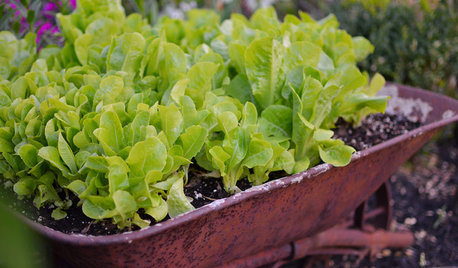You CAN freeze worms
inthebasement
15 years ago
Related Stories

GREEN BUILDINGThe Big Freeze: Inventors Break New Ground to Keep Things Cool
Old-fashioned fridges can be energy guzzlers, but there are more eco-friendly ways of keeping food fresh, as these global innovations show
Full Story
GARDENING GUIDESHouzz TV: Make a Worm Bin for Rich Soil and Happy Plants
A worm-powered compost bin that can fit under a sink turns food scraps into a powerful amendment for your garden. Here’s how to make one
Full Story
COMMUNITYCommunity Building Just About Anyone Can Do
Strengthen neighborhoods and pride of place by setting up more public spaces — even small, temporary ones can make a big difference
Full Story
GARDENING GUIDES4 Ways Gardens Can Go Beyond Aesthetic Beauty
Our landscapes can play an even more meaningful role if we rethink their purpose
Full Story
GARDENING GUIDES3 Easy Ways You Can Garden for Nature
Your choice of plants can help wildlife while cleaning the air and water
Full Story
GARDENING GUIDESYes, You Can Grow Food in a Shady Yard
Your shady garden doesn’t have to be forever barren. Berries, herbs and other shade-loving plants can produce a delicious bounty
Full Story
GARDENING GUIDESYes, You Can Grow an Edible Garden on a Hot, Dry Site
Difficult garden spots don’t need to deter you from planting trees, herbs and other delicious food plants
Full Story
LIFEHow Your Landscaping Can Keep Burglars Away
Prevent home break-ins with strategic landscaping and good practices instead of menacing — and maybe less effective — measures
Full Story
WINTER GARDENINGYes, You Can Enjoy Your Yard in December! Here's How
Garden writers around the U.S. share their favorite winter garden joys. See what to do in your region this month
Full Story
LANDSCAPE DESIGNCelebrate a Sunny Climate With the Right Leafy Palm for Your Site
So you get freezes or floods. So your garden is small. These palms send excuses riding off into the tropical sunset
Full Story





lkittle
boyle014
Related Professionals
Saint Louis Park Landscape Architects & Landscape Designers · East Patchogue Landscape Architects & Landscape Designers · Burlington Landscape Contractors · National City Landscape Contractors · West Orange Landscape Contractors · Oxon Hill Landscape Contractors · Aurora General Contractors · Decatur General Contractors · Euclid General Contractors · Las Cruces General Contractors · Mount Holly General Contractors · Riverside General Contractors · Troy General Contractors · Warren General Contractors · Westerly General Contractorscaptaindirt
Jasdip